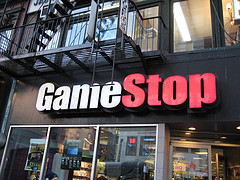Current & Former GameStop Employees Chime In On Pre-Order Upsells
For instance, there is L., the store manager who said in no uncertain terms that requiring a customer to pre-order another game in order to make a purchase is “not at all store policy and is the kind of poor customer service and business practice that gets people fired in this business.”
In contrast to the non-response the customer received when he contacted GameStop HQ, L. says that in his years of being with the company, “complaints of this nature do not get ignored (at least in my district), and many an employee has lost his/her job due to stupid integrity lapses such as this.”
But T., a reader who previously worked at a GameStop in Washington state tells Consumerist that he saw these sorts of shenanigans too frequently.
T. says Robert’s experience is “not in any way uncommon for certain locations.”
The former GameStopper says he told his manager about the concerns of one customer who had been through an upsell, similar to the one pushed on Robert, at a nearby GameStop, but that his query was greeted with a shrug.
“I was shocked by his causal response that store managers are free to pursue creative measures to enhance their metrics,” says the one-time employee, adding that some District Managers appear to “have no problem with the practice because it generates pre-orders which the company tracks relentlessly.”
This idea of pushing pre-orders at all costs was repeated by a number of other GameStop staffers who wrote in.
Another former employee, C., says that even though his store would get in more than enough copies to fill the pre-order reservations, “We were told to place the extra copies in the back. When a customer who did not pre-order the game came in to buy a copy, we were trained to make it seem like we might have 1 or 2 extras (even when we had 20+) and then ask them if they would like to reserve an upcoming game because they almost missed out on getting this game today.”
“GameStop stores (and their managers) live and die by the number of pre-orders and discounts cards they sell,” says B. a long-time employee at the chain. “It’s literally about the ONLY thing the company cares about with regards to its customers and they’ve become more and more hardcore about it with each passing year.”
As for the claim by the staffer in Robert’s story that the only way the store’s “system” would allow him to sell the new game was to enter a pre-order reservation for the coming release, B. calls that “a pile of bunk cooked up by some employee or possibly store manager to try and boost pre-order numbers… Games can be sold no matter what, regardless of whether the title is pre-ordered. When a game is released we can look in the system to see how many copies are pre-ordered and set those aside. The system has no way to differentiate between preordered and non-preordered games, it just rings up whatever we scan in.”
That being said, B. says he’s never heard of any GameStop store or employee who was able to get away with this kind of behavior for very long.
Finally, there’s M., who says that GameStop’s official policies, as written, are rather consumer-friendly when it comes to pre-orders — guaranteed ability of the game upon its release, pre-orders can be easily canceled for cash at any time — but that, unfortunately, not every store or employee follows the rules.
M. points out that if, as the employee in Robert’s story had claimed, the only copies left of Assassin’s Creed III were indeed reserved for customer who had pre-ordered, then the employee would have been violating store policy by selling one, regardless of the upsell attempt.
Regarding that upsell, M. says that “ANY attempt to coerce Robert into placing a pre-order under this or any other pretext is one of the worst ‘cooking the books’ mistakes that an employee can make.”
She also points to GameStop’s policy of judging its employees on performance metrics that could encourage the worker to push pre-orders on customers and also do anything they can to talk a customer out of canceling a pre-order.
“Unfortunately, store and employee evaluation are measured in ways that give personal incentives for an employee to break the rules, or for one particular store to ‘have a different policy,'” writes M. “But GameStop is a corporate entity, not a franchise, and store managers are not allowed to alter official GameStop policies. In either case, being caught could result in the employee being fired, ESPECIALLY if the wrong-doing was interpreted as an attempt by the employee to ‘cook the numbers’ and make the store’s performance appear to be higher than it actually is.”
It’s here that we point out that GameStop has still not responded to our request for comment on Robert’s story — and still hasn’t provided Robert with a proper response to the e-mail he sent back in early November.
Thanks to everyone who wrote in!
Want more consumer news? Visit our parent organization, Consumer Reports, for the latest on scams, recalls, and other consumer issues.


